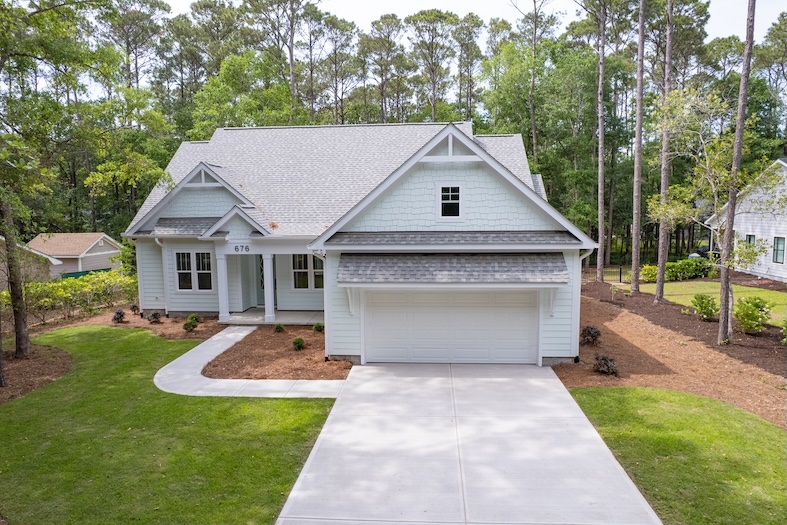How to Estimate the Cost of Your Custom Home in 2026

Quick Summary
-
Custom home costs in 2026 depend on design, materials, location, and lot conditions.
-
Begin by defining your goals, priorities, and desired home features.
-
Add land, permits, design fees, and site preparation to build a complete estimate.
-
Work closely with your builder throughout the design phase to refine costs.
-
Choose a local team familiar with coastal building requirements for the most accurate plan.
Understanding What Drives 2026 Home Costs
Building a custom home in North Carolina involves more than selecting finishes and floor plans. Total cost is influenced by your design complexity, construction materials, local regulations, and especially the lot itself. Coastal homes often require reinforced foundations, weather-resistant materials, and additional permitting steps that directly affect pricing.
The earlier you understand these cost drivers, the easier it is to plan, prioritize, and balance your design goals with a realistic investment.
1. Begin with Your Vision and Priorities
Before estimating costs, clarify your overall vision. Every decision—from layout to finishes—affects your budget in different ways.
Think through:
-
The number of bedrooms, bathrooms, and gathering spaces you want
-
How open or defined your layout should be
-
Whether you plan for outdoor living, bonus rooms, or multi-use spaces
-
The level of finishes and materials that best fit your lifestyle
By sharing these preferences early, your builder can guide design and structural decisions that align with your goals and long-term investment.
Related reading: 10 Custom Home Design Trends for 2026 in North Carolina
2. Factor in Land and Site Preparation
The lot you build on plays a major role in total cost. Two similar homes can vary significantly based on elevation, soil quality, and site accessibility.
Common lot-related considerations include:
-
Clearing and grading the property
-
Driveway and drainage installation
-
Soil testing and engineering reports
-
Utility connections or septic systems
-
Foundation design for flood zone compliance
In areas like Wilmington, Southport, and Leland, foundation adjustments or stormwater planning can impact your overall timeline and budget.
3. Account for Permits, Fees, and Professional Services
Before construction begins, your project will require various approvals and professional inputs. These are important to include in your estimate from the start.
They often include:
-
Building permits, engineering, and inspection fees
-
Architectural design or plan customization
-
Builder management and coordination fees
-
Land surveying and energy compliance reports
Starting from one of our Brandon Construction Group floor plans can streamline this phase while still allowing customization to your needs.
Reference: New Hanover County Building Safety Department
4. Select Finishes That Match Style and Longevity
Interior and exterior selections have a significant impact on both appearance and budget. Material quality and craftsmanship determine long-term maintenance costs and the overall feel of your home.
In coastal North Carolina, durable finishes like composite decking, fiber-cement siding, and stainless hardware add lasting value and reduce upkeep.
Related reading: How to Choose the Right Materials for a Coastal Home
5. Collaborate Early with Your Builder
Accurate estimating starts with early collaboration. Your builder can help align your vision with practical design solutions and clarify what’s included in each scope of work.
When reviewing estimates and proposals:
-
Review what’s included and what’s not
-
Confirm finish allowances and quality levels
-
Ask about projected schedules and construction timelines
-
Verify that your builder has experience with coastal projects
Early collaboration ensures your builder understands your goals and helps you avoid unnecessary changes once construction begins.
Related reading: How to Avoid Surprise Costs When Building a New Home in NC
6. Add a Contingency for Flexibility
Even the most detailed plans can shift once construction begins. Site conditions, product availability, or small design changes can affect pricing.
Including a contingency—typically 10 to 15 percent of your total budget—helps you stay flexible without compromising quality. This cushion protects your project and keeps it on track when adjustments are needed.
7. Build a Budget That Reflects Real Conditions
Every homeowner benefits from breaking down the project into clear categories rather than relying on general estimates.
These categories make it easier to plan, monitor, and adjust throughout the design and construction process.
8. Use Local Expertise to Refine Your Estimate
Coastal building in North Carolina comes with unique conditions that national averages don’t account for, such as wind ratings, salt exposure, and foundation elevation.
A local builder experienced in Brunswick, New Hanover, and Pender counties can help you budget for these regional factors accurately.
Brandon Construction Group specializes in designing and building homes that handle the coastal environment while staying true to your budget and design goals.
FAQ
Why shouldn’t I focus on cost per square foot?
Every home is unique. Factors like layout, finishes, and site conditions create too much variation for a simple cost-per-square-foot figure to be meaningful. It’s better to build a budget based on your design, location, and priorities.
What adds the most to a custom home’s cost?
Lot conditions, structural complexity, and finishes are typically the biggest factors. Coastal requirements can also increase cost but improve long-term durability.
How can I control cost without sacrificing quality?
Finalize your design early, make material selections before construction starts, and communicate regularly with your builder to avoid change orders.
When should I get a detailed estimate?
After completing the design phase, when plans and specifications are defined. Builders can then create an accurate line-item estimate based on your specific home.
How can I confirm that my budget is realistic?
Work with a builder who knows the local market. They can compare your design goals to current labor and material pricing to ensure expectations align with actual conditions.
Start Planning Your 2026 Home
Brandon Construction Group helps homeowners across coastal North Carolina design and build homes that reflect their lifestyle, vision, and investment goals.
See how we work: http://www.brandonconstructiongroup.com/about
View floor plans: https://www.brandonconstructiongroup.com/plans
Browse recent projects: https://www.brandonconstructiongroup.com/portfolio
Start the conversation: https://www.brandonconstructiongroup.com/contact
